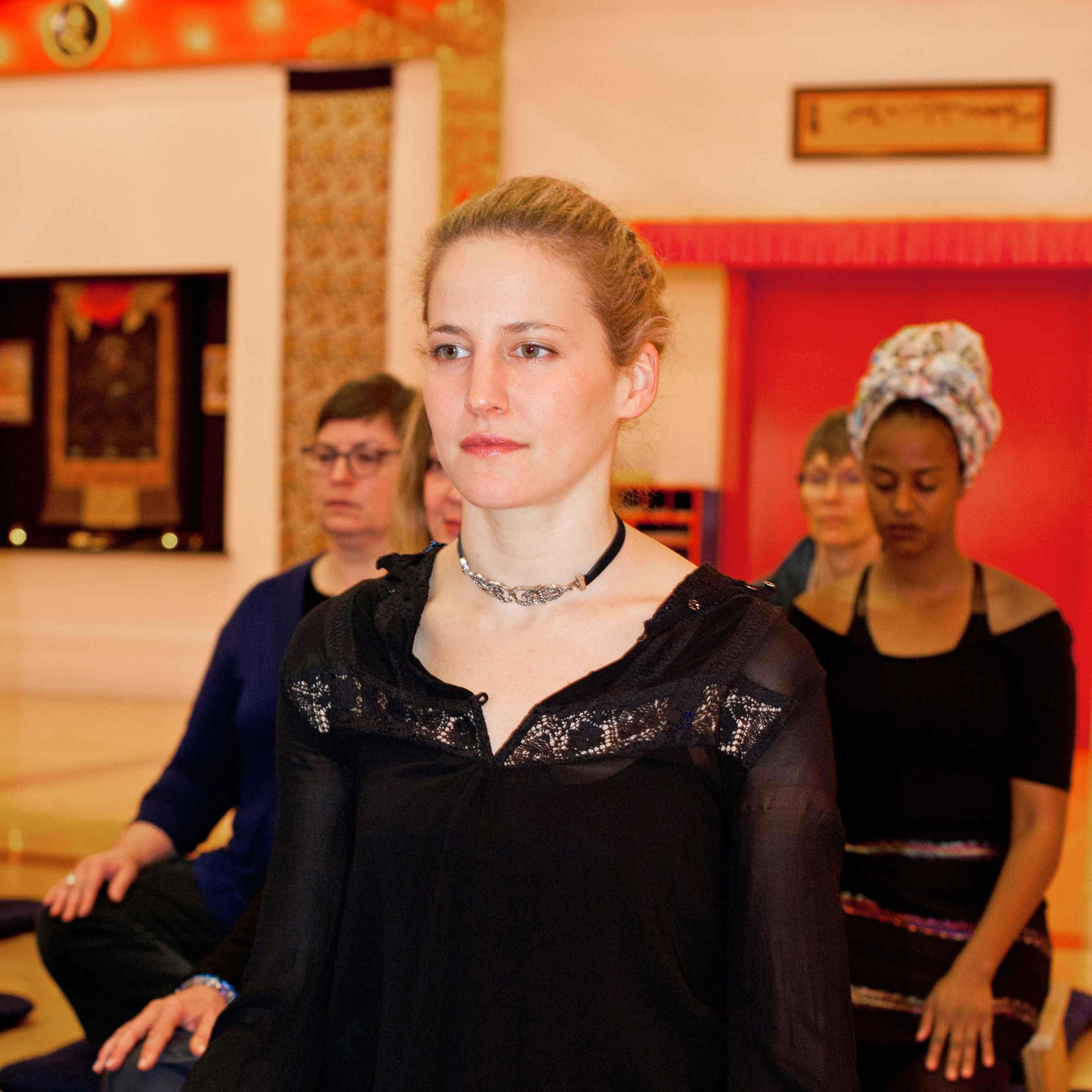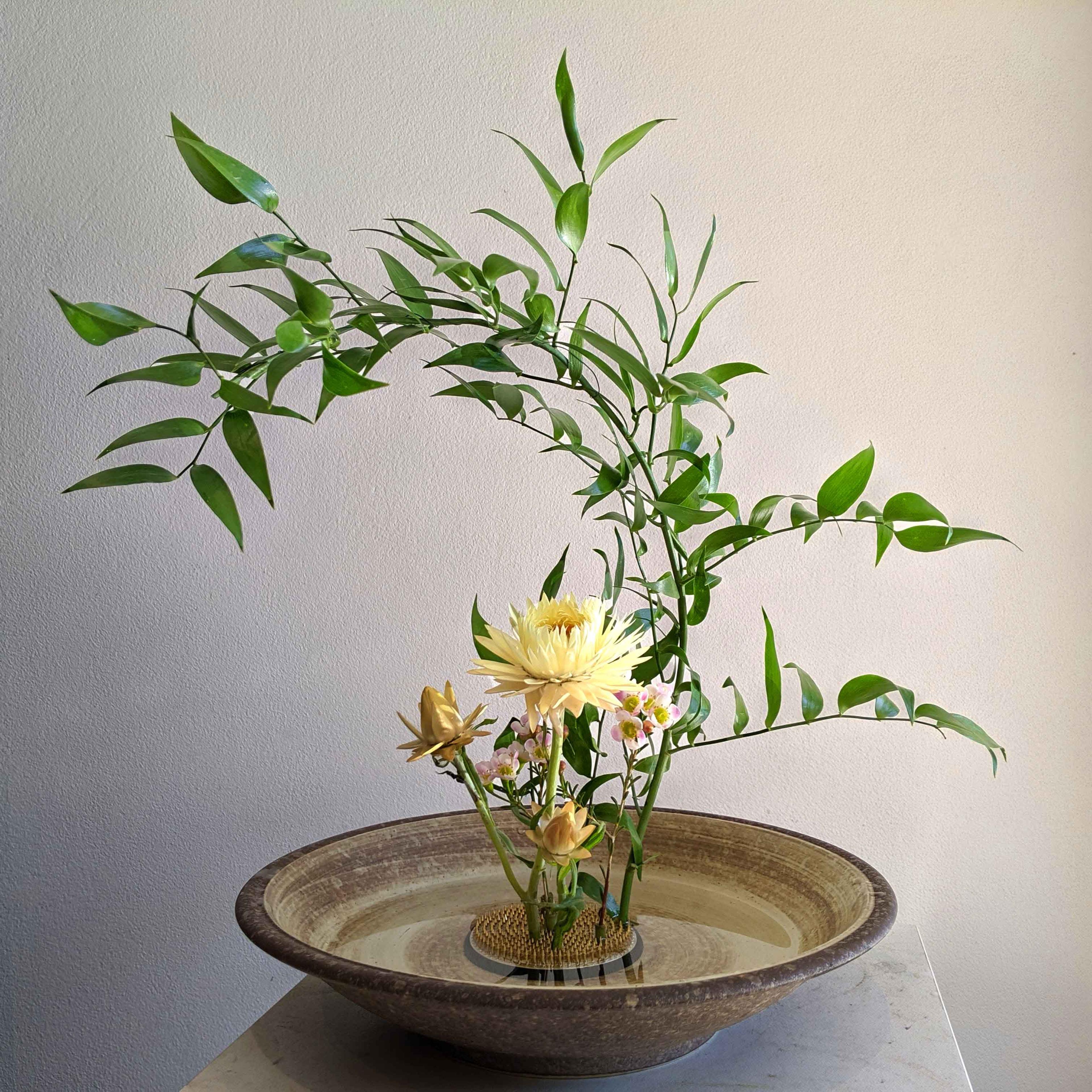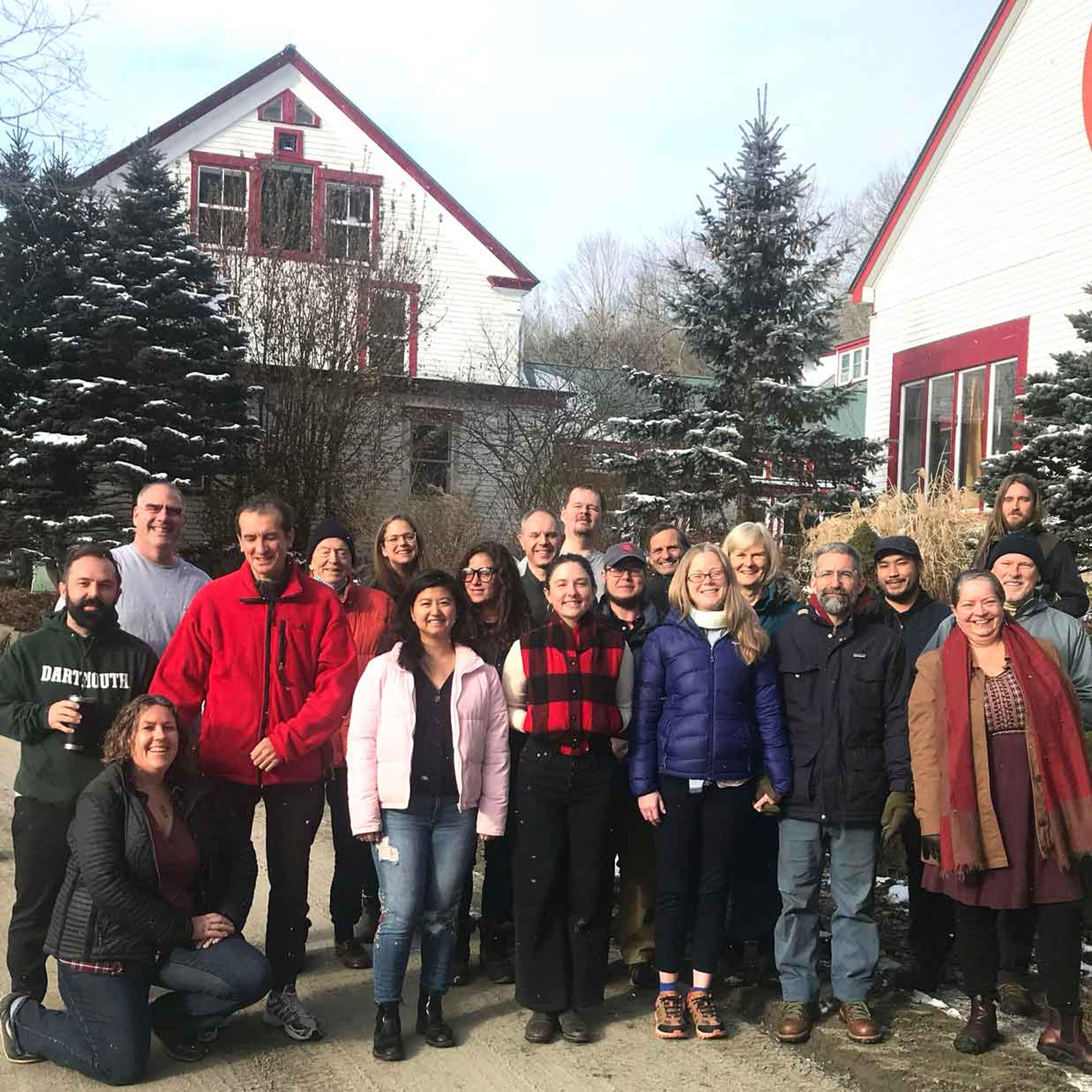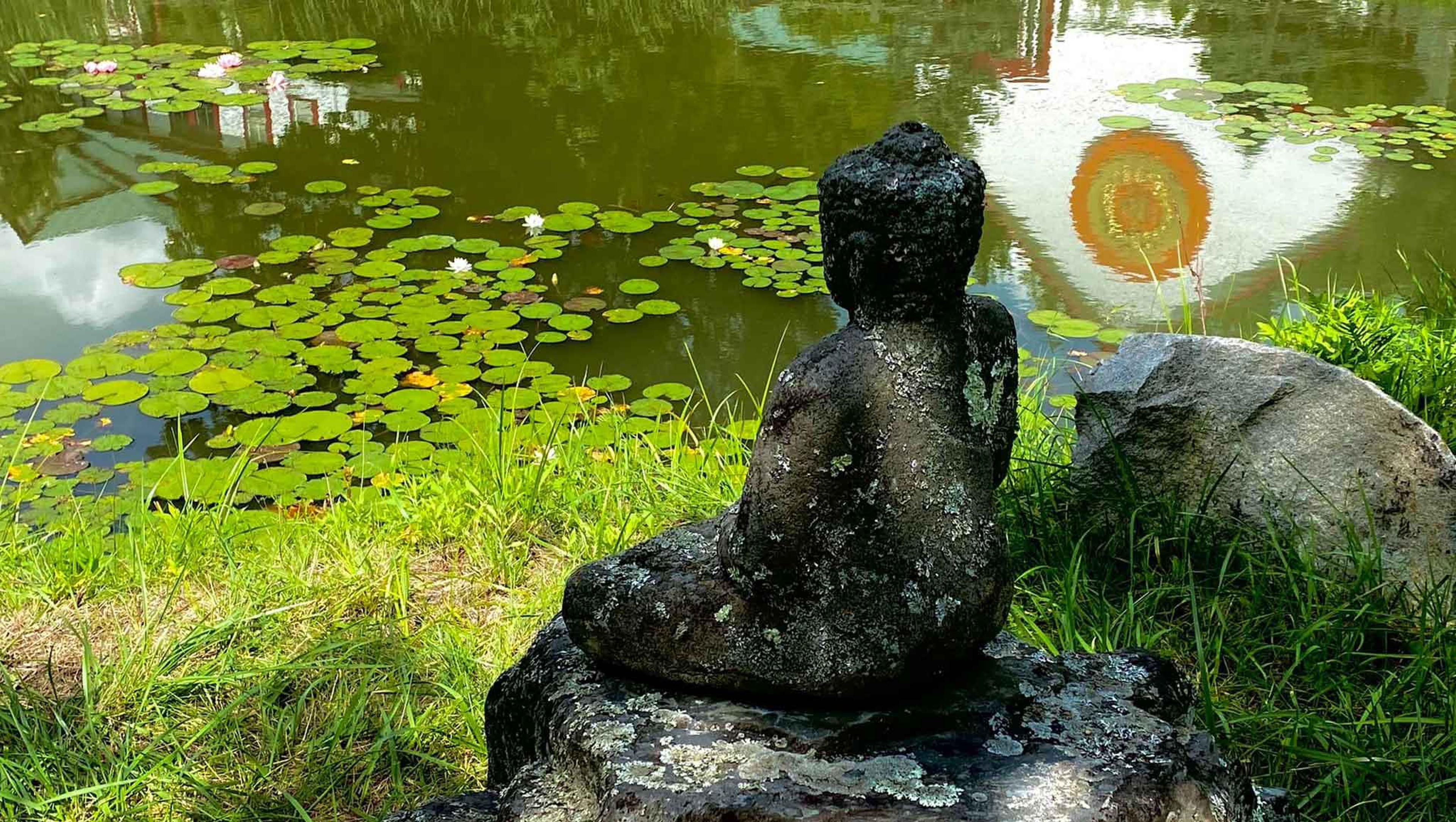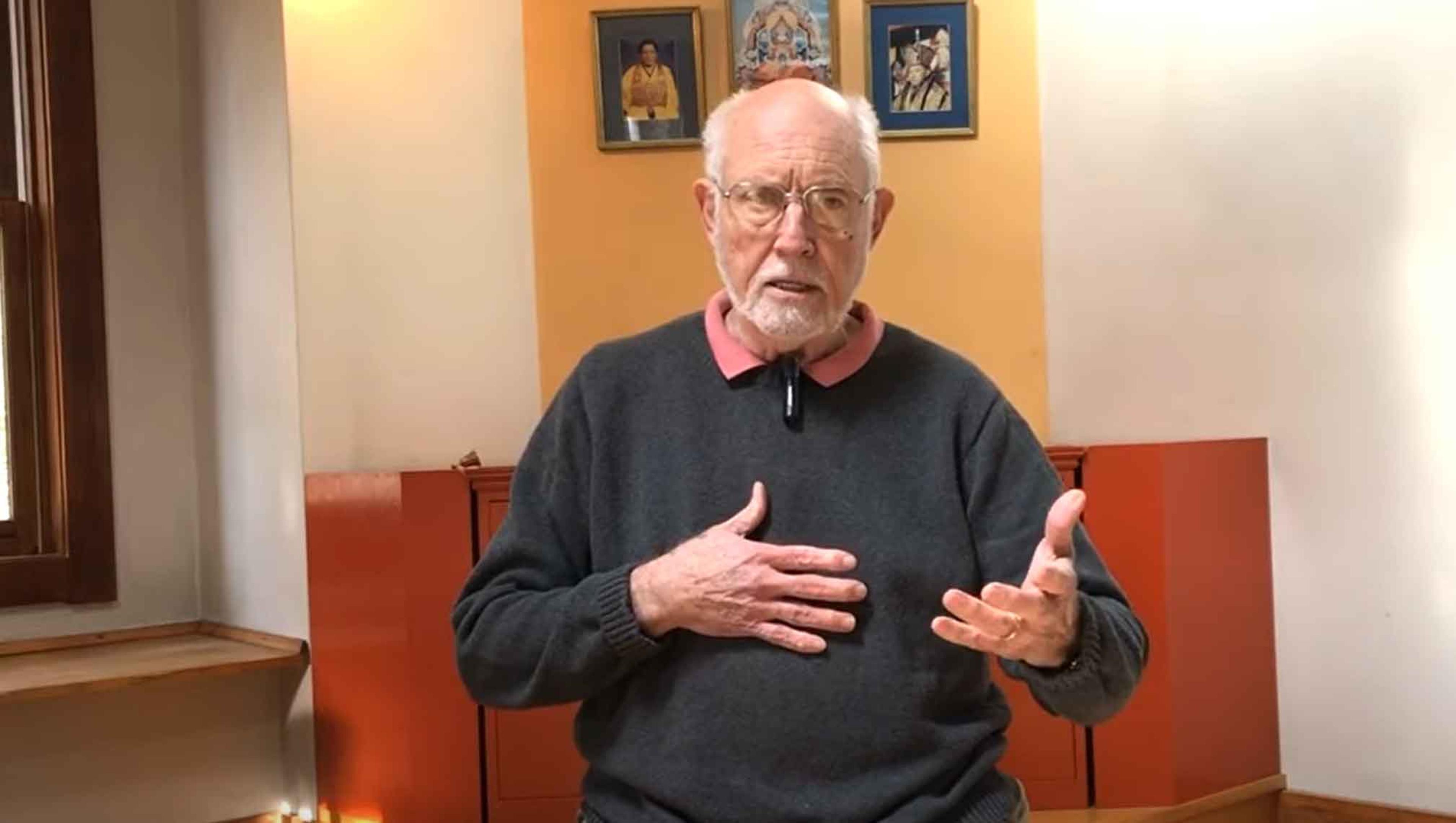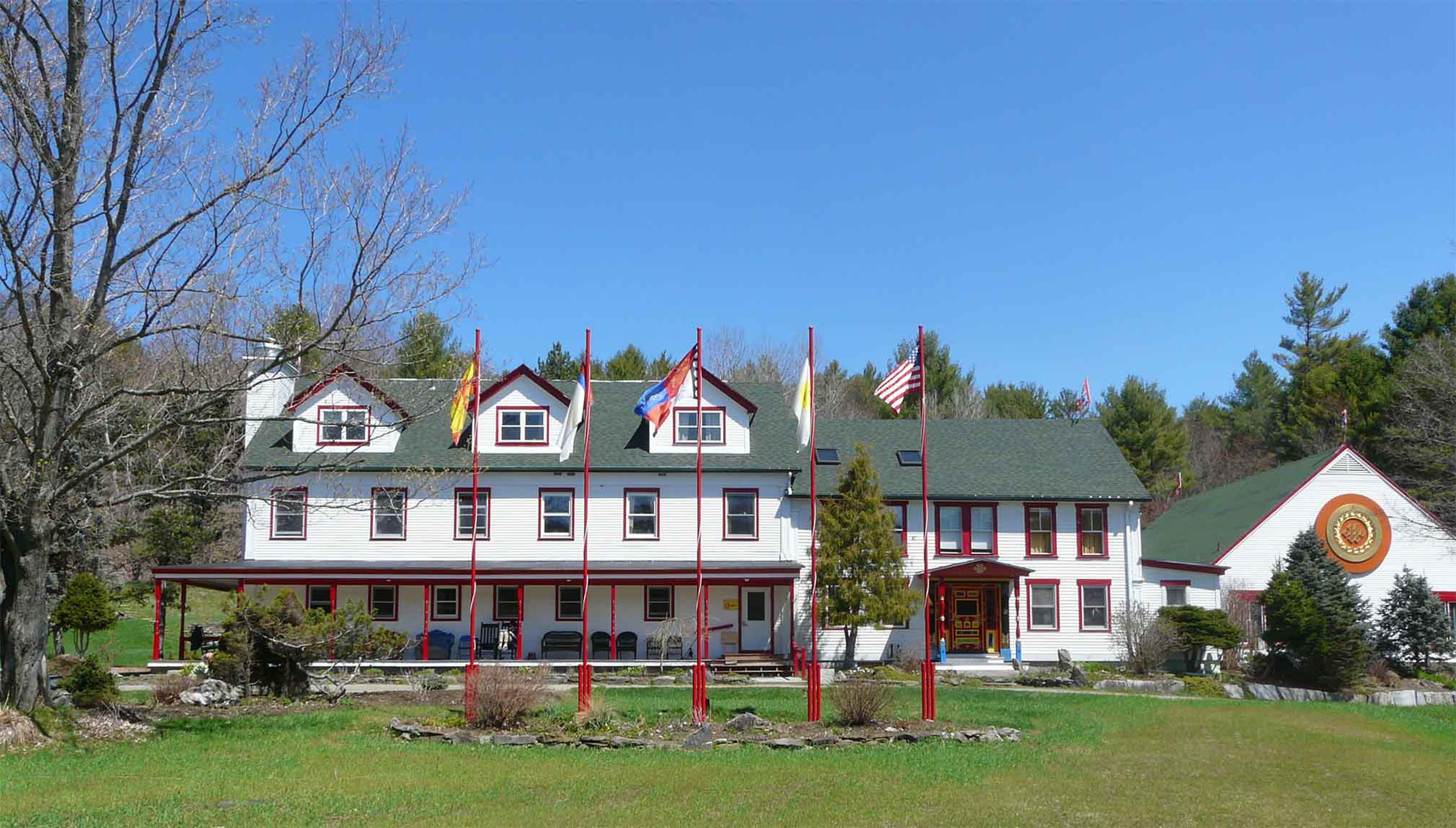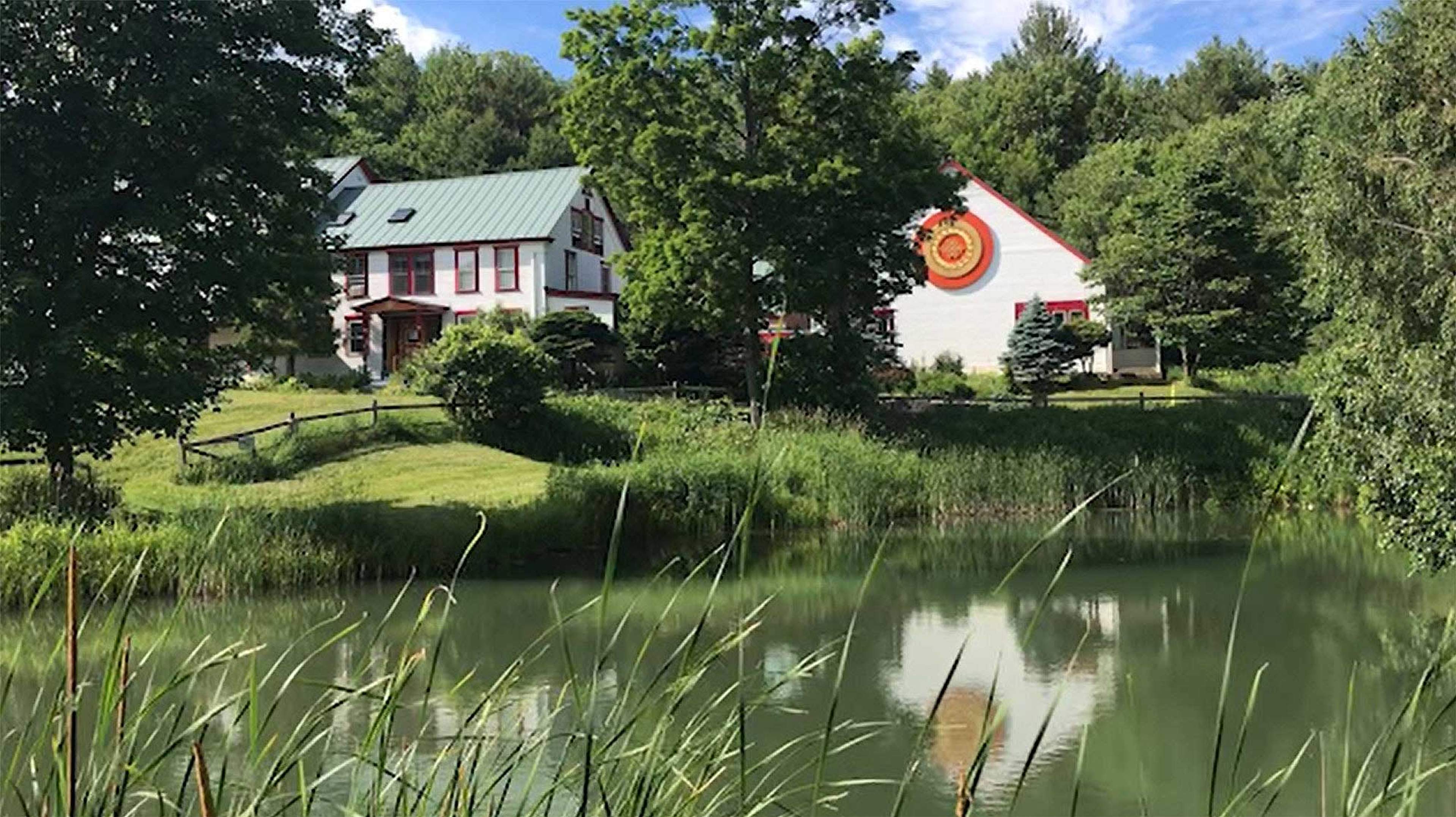
Who We Are
Karmê Chöling is a residential meditation retreat center situated on 500 acres of beautiful countryside in the Northeast Kingdom of Vermont. With the Green Mountains as the backdrop, the land is enriched by rolling meadows, woodland walking trails, and a one-acre organic garden.
Originally home to the Abenaki people, the land was turned into a dairy farm before it became our retreat center. We have six meditation halls, bright and open common spaces, a range of living quarters for full-time residential staff and program participants, along with seven rustic cabins in the woods for solitary retreats.
The first land center established by Chögyam Trungpa Rinpoche, Karmê Chöling has served the international Shambhala community for 50 years. Upon his passing, leadership passed to his son, Sakyong Mipham Rinpoche, and recently to the Shambhala Board. The center continues to offer programs for both new and experienced practitioners, with a community life rooted in meditation practice as a foundation for fostering enlightened society.

Our Mission, Vision, & Values
Below is our Mission, Vision, & Values statement, the result of a collaborative community process. Beginning with a survey and continuing through thoughtful reviews and feedback, the insights gleaned from this process helped us more clearly express who we are and what we aspire to offer. In many ways, Karmê Chöling itself guided this process—reminding us of her true spirit and how best she can serve. We invite you to read our Mission, Vision, and Values, and to join us in keeping Karmê Chöling a living beacon of goodness and sanity for all.
Mission
Karmê Chôling’s mission is:
- To provide space for teachings, practices, and community where innate goodness and wakefulness can be discovered and lives transformed.
- To illuminate the Shambhala path of gentleness and fearlessness and the Buddhist path of wisdom and compassion.
- To honor the sacredness of everyday life—work, relationships, and the natural world.
- To lay the foundation for an open-hearted society that benefits all beings and the earth.
In order to achieve its Fundamental Purpose, Karmê Chôling will:
- Carry forward the vision of Enlightened Society and freedom from spiritual materialism inspired by our founder, Chögyam Trungpa Rinpoche.
- Enrich individuals and community through practice, study, work, and play.
- Offer a wide array of programs in meditation, the contemplative and creative arts, care of the earth, family life, and leadership.
- Evolve and respond to the moment while remaining rooted in ancient wisdom.
- Serve as a home for the global Shambhala community of the past, present, and future.
Vision
Karmê Chöling is a torch of meditation and training ground for warriorship in the Shambhala Tradition, a beacon of sanity where compassion and goodness manifest in the world.
We envision a society that honors the inherent goodness, wisdom, and dignity of individuals and the sacredness of the world.
Inspired by this vision, generosity, discipline, patience, joyful exertion, meditation, and wisdom will lead humanity forward.
E Ma Ho!
KiKi SoSo!
Values
- We acknowledge Karmê Chôling sits on the sacred land of the Abenake
- We value our lineage, teachers, and breadth of our teachings
- We value meditation, study, work, and service
- We value the inherent goodness, wisdom, and dignity of all and welcome the voice of each person
- We acknowledge our rich and complex history
- We honor the resilience, confidence, and gentleness of our community
- We embrace collaboration, creativity, and humor
- We value sustainable stewardship of all our riches and resources
- We value the generosity, deep love and care people hold for Karmê Chôling
Living at Karmê Chöling
Meditation
Meditation retreats at Karmê Chöling focus on mindfulness-awareness practices. Through them we connect our innate goodness and natural intelligence to our engagement in the world. We offer traditional Buddhadharma teachings from the Kagyu and Nyingma lineages as well as teachings from our Shambhala lineage. We also offer programs for: family and youth, mind-body wellness training, in-depth meditation, dharma art, silent retreats, mindful leadership and women's retreats. In addition we have secluded cabins for solitary retreats.
Culture
Our culture has emerged from over 50 years of contemplative practice on this exceptional land, blessed by many great teachers of the Kagyu, Nyingma, and Zen Buddhist traditions. Our traditions are rooted in the principle that every human being has fundamental goodness, warmth, and wakefulness. Joining the practicalities of daily life with the heart of meditation, immersed in the natural elements—sky, wind, water, earth—we are continually enriched by the world around us.
Explore Karmê Chöling
Articles & Videos
Inclusivity at Karmê Chöling
Karmê Chöling is committed to providing an environment that is welcoming, safe, and caring for all. We recognize that we all come with a variety of backgrounds and identities that impact our experience of being in community and guide how we interact with the world.
Dharma communities are not immune from individual and organizational habits and practices that contribute to marginalization. By engaging the community through dialogue, education, policy, and other efforts, our intention is to create a supportive and inclusive environment for all.
If you have any questions or concerns regarding diversity and inclusion in our community, please email our Care & Conduct committee.

FAQ
A History of Shambhala's Lineage Teachers
Since the establishment of Karmê Chöling in 1970, Shambhala has been guided by three principal teachers. Each of these teachers are renowned for their brilliant presentation of the Buddhadharma and Shambhala teachings. However, their legacies have been marred by controversies involving sexual conduct, alcohol use and use of power. Following are brief summaries of each teacher. A subsequent section provides an overview of measures taken by the Shambhala community to address the issues that emerged.
Originally the head of the Surmang Monastery in Eastern Tibet, Chögyam Trungpa Rinpoche was recognized as the 11th of the Trungpa tulkus at a young age, making him part of a line of incarnate Tibetan lamas. Following the Chinese invasion of Tibet, Trungpa Rinpoche led a party of refugees through the Himalayas on foot, reaching India in 1960.
Trungpa Rinpoche was trained in the Karma Kagyu and Nyingma schools of Tibetan Buddhism and was part of the nonsectarian movement that aimed to dissolve rivalries and bring together the different schools of Tibetan Buddhism. This movement, along with the culture of the 1960s in America that he found himself in, heavily influenced his presentation of Tibetan Buddhism to Westerners. Rather than relying on a heavily religious presentation, Trungpa Rinpoche developed a secular framework and curriculum that could be used to teach dharma to lay practitioners called the Shambhala teachings. By using simple yet poetic language and delivering talks, Trungpa Rinpoche was largely responsible for the dissemination of Tibetan Buddhism to America.
While his methods of transmission created an open way to approach the dharma, Trungpa Rinpoche’s renunciation of his monastic vows and unique way of teaching have made him a controversial figure. His use of alcohol and allegations of sexual misconduct with students have caused confusion and pain for many in the Shambhala community, and many students of his have held different perspectives and had different experiences with him as a teacher.
Chögyam Trungpa Rinpoche died in Halifax, Nova Scotia on April 4th, 1987.
After Chögyam Trungpa's death, the Shambhala community was led by his appointed dharma heir, an American student named Thomas Rich. Thomas Rich, known by his dharma name as Ösel Tendzin, was empowered by Trungpa Rinpoche as his Vajra Regent in 1976. “Regent”, translated from the Tibetan word “gyaltsab”, is a religious title that makes one a representative of their community. Thomas Rich was known in the Shambhala community primarily by his dharma name, Ösel Tendzin.
The Vajra Regent Ösel Tendzin taught widely in the community, and was recognized for his brilliance as a dharma teacher and devotion to the Buddhist path. He also engaged in sexual relationships with students, which was controversial in the community both then and now. In the fall of 1988, the community learned that the Vajra Regent had not only been diagnosed with HIV/AIDS, but that he had continued having sexual relationships with students after receiving this diagnosis. This led to a major upheaval in the community, and eventually the Vajra Regent was directed by HH Dilgo Khyentse Rinpoche, the head of the Nyingma lineage of Tibetan Buddhism, to enter into retreat.
The Regent’s health declined, and he died in August 1990.
In 1990, Chögyam Trungpa Rinpoche’s son, Ösel Rangdrol Mukpo (then known as the Sawang, now known as Sakyong Mipham Rinpoche), returned to North America from his studies in India. Shortly after the Regent’s death, Dilgo Khyentse Rinpoche and Jamgön Kongtrül Rinpoche proclaimed the Sawang as the holder of Buddhist and Shambhala lineages of Trungpa Rinpoche and the leader of the Shambhala community. Later, in May 1995, he was empowered by His Holiness Penor Rinpoche, the head of the Nyingma Tibetan Buddhist lineage, as Sakyong (Tibetan for “earth protector”), a title also held by Trungpa Rinpoche. At that time, he was also recognized as the reincarnation of Jamgön Mipham Jamyang Gyatso, a great teacher in 19th-century Tibet. Since that time, he has been known as Sakyong Mipham Rinpoche.
Between 1995 and 2018, Sakyong Mipham Rinpoche served as both the spiritual and organizational leader of the Shambhala community. In this role, he led the development of innovative curricula that combined presentations of the Buddhist and Shambhala dharma, presented commentary and meditation practices based on Trungpa Rinpoche’s Shambhala teachings, and explored the manifestations of enlightened society in retreats, seminars, and practices. He also wrote popular books on meditation and the Shambhala teachings, including Turning the Mind into an Ally and Ruling Your World. During this period of Sakyong Mipham Rinpoche’s leadership, our global community grew larger and more complex, transitioning through a range of organizational forms and governance arrangements.
In early 2018, allegations surfaced of sexual misconduct and misuse of power by Sakyong Mipham Rinpoche toward his students. In July 2018, he sent a letter informing the community he would step back from his administrative and teaching responsibilities in Shambhala and support a third-party investigation. As investigations and concerns continued, the Kalapa Council (the Shambhala Board appointed by Sakyong Mipham Rinpoche) resigned, and Sakyong Mipham Rinpoche agreed to the establishment of an independent Board of Directors, drawn from members of the Shambhala community, to hold fiscal and organizational responsibility for the organization.
Many community members felt that a fuller process of community healing, in which Sakyong Mipham Rinpoche would participate, was needed to move forward together. Others wished to continue as students of Sakyong Mipham Rinpoche with or without additional processes of community healing or repair. Community members held many overlapping views within a wide spectrum of viewpoints, and could not reach consensus as to the way forward. This led to division in the Shambhala community.
In February 2022, a legal agreement between Sakyong Mipham Rinpoche and the Shambhala Board altered Shambhala’s organizing documents so that Shambhala is now self-governing and financially independent of Sakyong Mipham Rinpoche. He is not engaged with the Shambhala organization and is teaching through his own organization, the Sakyong Potrang.
Moving Forward With What We've Learned
Karmê Chöling continues to operate as a meditation retreat center. Although there have been controversies involving leadership throughout the history of Shambhala as an organization, Karmê Chöling is committed to building on what has been learned from the past. We have made remarkable strides to address systemic issues within the historical and cultural context of Shambhala.
In order to create an environment where students' practice can come first and be protected by a safe environment, we are taking responsibility to improve the overall health, morale, and welfare of the community. This work is vital for future generations to benefit from our tradition and heritage.
In the timeless classic Shambhala: The Sacred Path of the Warrior, Chögyam Tungpa Rinpoche says,
The essence of warriorship, or the essence of human bravery is refusing to give up on anyone or anything ... in the vision of the Great Eastern Sun, no human being is a lost cause. We don't feel we have to put a lid on anyone or anything. We are always willing to give things a chance to flower.
At Karmê Chöling, we are not hiding or denying the dark pages of our history. We are taking steps to address them and growing in the process. As a result, we are seeing many green shoots and blossoming flowers.
Steps That Have Been Taken Globally
At Shambhala Global Services (Karmê Chöling's parent organization)
- Tara Templin: Tara Templin has been instrumental in leading the effort to change the Shambhala culture to one of diversity and safety. She is the Director of Community Care and Conduct at Shambhala Global Services and has put considerable work in updating its Care and Conduct policy. You may contact her directly at: tara.templin@shambhalaglobal.org
- The Code of Conduct Hub Site: Global Services has done a huge amount of work in the areas of Policies, Training, Process, People and Resources. You can find all of this and more at: code-of-conduct.shambhala.org/
- Teacher Training: Tara Templin and Shambhala Global have especially given attention to training in these areas:
Steps That Have Been Taken Locally
At Karmê Chöling
Additionally, Karmê Chöling has done considerable work in our local land center to address these same issues:
- Care and Conduct Committee: We are updating our current Care and Conduct policy to strengthen our embodiment of the view and practices described in the Shambhala Code of Conduct.
- The members on this committe will in turn become the staff that participants and household members can reach out to if they feel that there has been misconduct at Karmê Chöling.
- Applicant Diversity Committee: We are finding ways to bring more diversity into our leadership, teachers, staff and participants.
- College & University Outreach: Karmê Chöling is in partnership with state & local colleges and universities through work study programs.
- Mediator: Karmê Chöling has a trained Formative Mediator on staff. Ella can be reached at: ella@karmecholing.org
- Karmê Chöling also has a Code of Conduct facilitator from Shambhala Global on staff.
- Women in Leadership Retreat: Karmê Chöling is hosted the first Women in Leadership program in 2024, sponsored by Shambhala Global Services and led by Tara Templin.
We have gone through the process of bearing witness to immense pain, discord, and division. We are committed to societal harmony and ensuring everyone's safety by engaging in continuing education, teacher training, staff training, and emphasizing the immense value of care and ethical conduct in our community. Furthermore, we are attempting to shine a light on the darkest corners of our past by ensuring that marginalized voices are heard.
Furthermore, Karmê Chöling is developing new initiatives to create a culture of sanity, stability, inclusion, and change through meditation and social action. This is leading to compassionate dialogue, deep listening, and tolerance for individuals with other teachers, and community building -- as well as rebuilding.
Everyone is welcomed at Karmê Chöling!
At Karmê Chöling, you are invited to be a part of the positive change you want to see and feel. If you have ideas on how we can improve we are open to hearing your feedback!
Financial Overview
For 2024
Surrounded by the magnificent woodlands of Vermont, our beautiful center is a place where participants, residents, and staff can meet their own mind with curiosity and compassion. This year’s work, represented by the financial reports that follow, are possible because of the generosity and care of our community.
Was this helpful?
Share This

